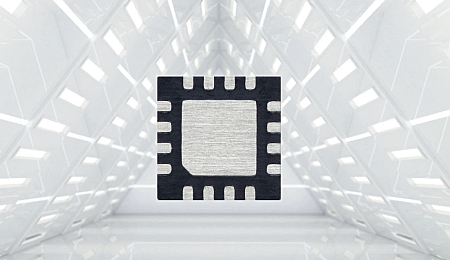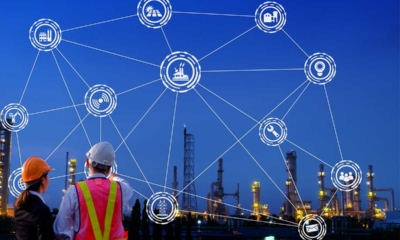The Internet of Things (IoT) has been a revelation, showing up in our daily lives via connected smart devices like smartphones and smartwatches, but also enabling smart homes. However, IoT has plenty of uses for business applications as well.
Across key industries such as manufacturing, logistics, and transportation, the Industrial Internet of Things (IIoT) is driving digital transformation initiatives. This post will examine how IIoT works, how businesses can use this technology and the major benefits of IIoT.
What Is Industrial IoT?
In a manufacturing setting, such as a factory, industrial IoT typically involve a system of interconnected sensors, actuators, computer networks, connected production facilities, and software for data collection and exchange, with the possibility of remote control and control in an automated mode, all without human intervention.

Essentially, IIoT works by installing interconnected sensors, instruments, and other devices on industrial equipment. Data is collected from these devices and sent to the company’s systems, allowing employees to remotely monitor these machines and make improvements in productivity and efficiency if needed.
Key technologies that enable IIoT include cloud computing, edge computing, big data analytics, as well as artificial intelligence and machine learning. The digital transformation brought on by IIoT has brought on Industry 4.0, or the “Fourth Industrial Revolution.” Industry 4.0 is driven by smart machines packing modern control systems and embedded software that enable these machines to connect with one another via IoT.
How Can Businesses Use Industrial IoT?
For some time, IIoT’s primary adopters were manufacturers looking to invest in efficiency-driving technologies. However, IIoT is not restricted to factories and warehouses. Industries such as oil and gas, energy, and healthcare are all beginning to adopt IIoT technologies.
Recently, city planners and civil engineers have begun using IIoT technology to build smart cities that can employ facial and license plate recognition, access control, smart roadways, and autonomous vehicles. These sensors can send and receive data without human interference to make informed and independent decisions that enhance safety, reduce the environmental impact, and more.
More generally, companies can use IIoT to monitor inventories, automate product inspections, optimize workflows, increase workplace safety, and minimize downtime by looking at data continuously and modifying processes accordingly. In certain situations, the system can also increase factory employees’ protection and simplify maintenance work by detecting and repairing possible issues before they happen.
The Benefits of Industrial IoT

For any organization dealing with the production and transportation of physical products, the Industrial Internet of Things can provide dramatic new levels of operational efficiency and innovative business models. Here are just a few potential IIoT benefits across important industries:
Manufacturing
This is the industry where most of the IIoT solutions are currently being implemented. IIoT-enabled machines can monitor their condition and anticipate potential problems, leading to less downtime and increased overall efficiency.
Supply Chain
With sensor-assisted inventory management, IIoT can be used to order supplies before they run out of stock automatically. This ensures that in-demand goods are always available.
Building Management
Through interconnected sensors, buildings can operate their own climate control systems. Also, devices that monitor building entrances can respond quickly to potential threats, increasing building security.
Healthcare
With devices that remotely monitor patients and immediately notify healthcare providers when a patient’s condition changes, IIoT can improve healthcare facilities’ accuracy and responsiveness.
Retail
By leveraging storefronts that are updated based on consumer interests and the ability to prepare smart promotions, large retailers implementing IIoT technology can achieve a significant advantage over their competitors.
The Challenges of Industrial IoT
Within the last several years, IIoT has seen substantial development. However, a few underlying challenges are preventing industries from investing fully in IIoT technologies:
Battery Life
As with any IoT devices, a long battery life is a must, especially in industrial settings. Many sensors are in hard-to-reach or remote areas, making it tough for technicians to frequently replace the batteries.
Security
As manufacturing processes get smarter, the production methods are becoming more technologically driven as well. Most connected devices exchange sensitive data directly with the cloud, needing ways to ensure security and compliance.
IT and OT Convergence
In Industry 4.0, it is challenging to combine informational technology (IT) and operational technology (OT). In a nutshell, IT involves the use of physical devices to create, exchange, and store data, while OT involves hardware and software detecting or causing a change through industrial equipment.
IT is more advanced with well-defined policies, whereas OT is an emerging development that has not historically been an interconnected technology. As such, aligning IT systems with OT processes can be difficult.
How Ambiq is Helping
IIoT technologies that form the building blocks of smart factories and smart metering systems must be reliable when it comes to battery life. Since these devices perform computing operations at the edge, they need to ensure their processors can perform these tasks on a low electrical charge.
Ambiq’s ultra-low-power wireless SoCs are at the core of millions of connected sensors that enable critical technologies in key industrial sectors including Bluetooth Low Energy. Networked sensors and other intelligent devices powered by Ambiq products can continue to grow and develop.



